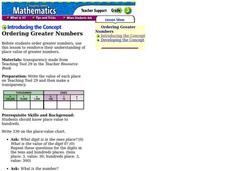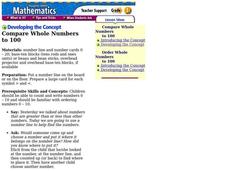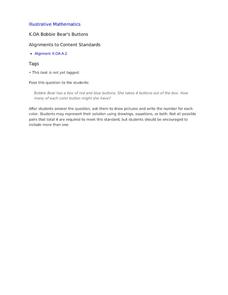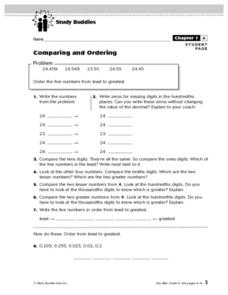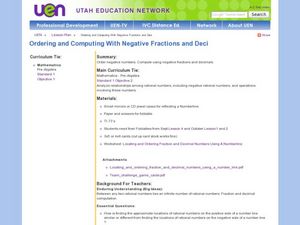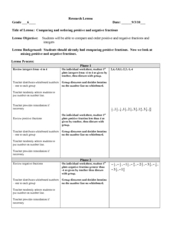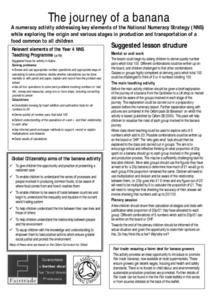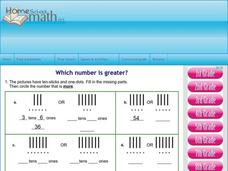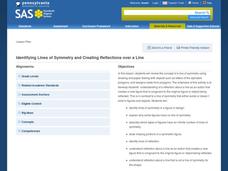Curated OER
Comparing and Ordering Greater Numbers
Students compare and order greater numbers. In this place value lesson plan, students use a place-value chart to identify which set of numbers has the greatest value.
Curated OER
Ordering Greater Numbers
Third graders identify the place value of greater numbers. In this number sense lesson, 3rd graders use a place value chart to properly write a specific number. Students read the number and use the place value map for reinforcement.
Illustrative Mathematics
Which Number is Greater? Which Number is Less? How do you Know?
When comparing groups of objects, it's easy for children to identify which has more, but it's not so easy for them to explain their reasoning. This simple whole-group activity provides multiple opportunities for learners to compare...
Curated OER
Comparing and Ordering Greater Numbers
Students line up the digits of the numbers they are comparing in the correct manner. For this comparing numbers lesson, students learn to line numbers up correctly on a place value chart before comparing them. Students then answer...
Curated OER
Compare Whole Numbers to 100
Students practice comparing whole numbers. In this number comparison lesson plan, students use number lines, number cards, base-ten blocks, and bean sticks to practice comparing whole numbers that range to 100. Students follow the...
Curated OER
Is Your Order Up or Down?
Students practice ordering numbers. In this number sense lesson, students collaborate to order whole numbers from greatest to least and least to greatest. Students also practice the concept by using educational software.
Curated OER
Comparing Two Digit Numbers Using Symbols
Second graders compare two digit numbers. In this comparing numbers lesson, 2nd graders discover greater than and less than symbols. Students read Five Little Monkeys Sitting In A Tree and use the story as a model for comparing numbers....
Curated OER
Lesson 3: Number Sense
Learners solve word problems using number sense. They convert fractions to decimals and mixed numbers. Pupils determine if a given fraction is greater or less than another fraction, and order numbers on a number line.
Illustrative Mathematics
A Bobbie Bear's Buttons
Young mathematicians help Bobbie Bear pick colored buttons out of a box as they learn how to decompose numbers less than 10 into pairs of smaller numbers. To support students with the process, consider creating a worksheet or graphic...
Curated OER
Lesson Design Protocol: Add and Subtract
Addition and subtraction are studied in this math lesson. Upper graders add and subtract whole numbers up to 1,000 with and without regrouping.
Curated OER
Lots of Lakes: Greater Than, Less Than
To set up this activity, your class explores Minnesota's nickname as the Land of 10,000 Lakes, and the back of the state quarter that features a Minnesota lake. Young mathematicians compare the number 1 to the number 10,000 with support...
Curated OER
Investigation--Comparing and Ordering Fractions
Fourth graders use fraction strips to compare and order fractions. Identify various ways a figure can be divided. Find equivalent fractions. Recognize and order fractions with the denominators 2,3,4,5,6,8,10, and 12.
Curated OER
Comparing and Ordering (Decimal Numbers)
In this math worksheet, young scholars learn to compare and order five numbers in a set. Numbers are decimals to the thousandths place. Students answer 8 questions. There are also activities which can be done with a partner.
Arizona Department of Education
Introduction to Integers
Welcome to the backward world of negative numbers. This introductory lesson teaches young mathematicians that negative numbers are simply the opposite of positive numbers as they use number lines to plot and compare...
Curated OER
Compare Whole Numbers to 100
First graders compare whole numbers that range in number to 100. In this number comparison lesson, 1st graders use number cards to help them order numbers. Students determine which numbers are greater and which are smaller than the given...
Curated OER
Teenagers
For this fast-paced activity, learners identify the order of numbers from 13 to 20. They practice greater than and less than with verbal responses to pairs of numbers. Suggested accompaniments include counting forward and backward to 20....
Curated OER
Ordering Numbers
Seventh graders compare and contrast positive and negative numbers. They create a T-Chart and list real word examples of positive an negative numbers. After observing an number line and a football field, 7th graders describe the...
Curated OER
Ordering and Computing with Negative Fractions and Decimals
Seventh graders explore the concept of computing negative fractions and decimals. In this negative fractions and decimals lesson, 7th graders compare ordering positive fractions to ordering negative fractions. Students use mirrors to see...
Curated OER
Comparing and Ordering Positive and Negative Fractions
The comparison and ordering of positive and negative fractions is the focus of this math lesson. Sixth graders are given one card each that has a fraction written on it, and they must put themselves into the proper order in a "human...
Illustrative Mathematics
Comparing Rational and Irrational Number
Algebra learners must know how to use rational numbers to approximate irrationals. This resource asks participants to decide which number is larger without using a calculator. It makes a great exercise to use as a five-minute transition...
Curated OER
The Journey of a Banana
To investigate the price of bananas in order to evaluate basic counting and number sense skills, your mathematicians focus upon multiplication and problem solving that incorporates social studies in the form of building awareness about...
Curated OER
Which Number is Greater?
Students draw pictures of two digit numbers to identify the greater value. In this math lesson, students plot two digit numbers on a number line and identify the greatest or lesser value. Students use the greater than and less than...
Curated OER
Identifying Lines of Symmetry and Creating Reflections over a Line
Fifth graders review the concept of a line of symmetry by using pieces of paper that have pictures such as, letters of the alphabet, polygons, and designs made from polygons in order to determine if they have symmetry. The fine,...
Curated OER
Exponential Growth versus Polynomial Growth
Your algebra learners explore the values of two types of functions in order to compare growth rates in this short cooperative task. Two types of solutions are given, using a table of values and an abstract argument.

